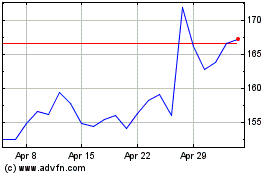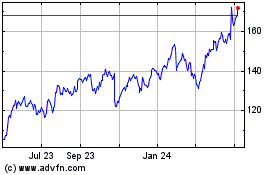By John D. McKinnon
WASHINGTON -- Top state law-enforcement officials from across
the country are formally launching antitrust probes into Facebook
Inc. and Alphabet Inc.'s Google starting next week, further
pressuring tech giants already under federal scrutiny over whether
their online dominance stifles competition.
The moves, involving two large bipartisan coalitions of state
attorneys general, add considerable heft to the investigative
efforts under way in Washington. As in the government's antitrust
action against Microsoft Corp. two decades ago, state attorneys
general are likely to provide important contributions to the
substance of the investigations, complementing the federal
efforts.
"The states can play a crucial role in augmenting federal
antitrust enforcement," said Gene Kimmelman, a senior adviser at
Public Knowledge, a consumer group that focuses on tech issues.
"Cases are so resource intensive that dividing the work could be
enormously valuable to cover the entire digital landscape."
Details of the Google probe are to be disclosed at a news
conference outside the U.S. Supreme Court on Monday. A bipartisan
group of perhaps more than 40 attorneys general will join that
effort, which is being led by Texas Attorney General Ken Paxton, a
Republican, according to people familiar with the matter.
In a news release Friday, Mr. Paxton's office said the news
conference will detail "a multistate investigation into whether
large tech companies have engaged in anticompetitive behavior that
stifled competition, restricted access and harmed consumers."
Formal civil subpoenas are likely to begin going out from that
effort soon, according to the people familiar with the matter. The
investigation will examine Google's impact on digital advertising
and information markets, according to one of the people, as well as
whether the firm has stifled innovation or harmed consumer choice
and privacy.
Separately, New York Attorney General Letitia James, a Democrat,
confirmed a Wall Street Journal report Friday that her office is
organizing a bipartisan, multistate antitrust probe into whether
social-media company Facebook "has stifled competition and put
users at risk," as she said in a statement. "We will use every
investigative tool at our disposal to determine whether Facebook's
actions may have endangered consumer data, reduced the quality of
consumers' choices, or increased the price of advertising."
Joining in the Facebook investigation so far are attorneys
general of Colorado, Florida, Iowa, Nebraska, North Carolina, Ohio,
Tennessee and the District of Columbia, Ms. James said. The
wide-ranging investigation focuses on Facebook's "dominance in the
industry and the potential anticompetitive conduct stemming from
that dominance," her office said.
Facebook recently agreed to shell out $5 billion to settle
Federal Trade Commission allegations that it repeatedly used
deceptive disclosures and account settings to lure users into
sharing personal information, and it remains under federal scrutiny
for issues including whether it acquired companies such as
Instagram to stave off competition. State attorneys general also
are expected to examine those issues, along with Facebook's use of
data and its role in the huge digital advertising market.
This year, Google's share of the total U.S. digital ad market
will be 37%, and Facebook's will be 22%, according to eMarketer, a
research firm.
Facebook declined to comment.
Google, which also is facing a Justice Department antitrust
probe, said it is cooperating with the inquiries.
"Google's services help people every day, create more choice for
consumers, and support thousands of jobs and small businesses
across the country," said Google spokesman Jose Castañeda. "We
continue to work constructively with regulators, including
attorneys general, in answering questions about our business and
the dynamic technology sector."
Tech firms generally have contended that they operate in highly
competitive markets.
The action by the attorneys general, which has been anticipated
for weeks, could be expanded to other companies beyond Google and
Facebook soon, some of the people said.
Public-opinion polls suggest Americans are increasingly growing
disenchanted with tech companies, in particular social-media
platforms, even as they remain hooked on their services.
Some of the state officials already contend that the tech
companies' dominance is producing harmful effects.
"The extreme concentration in the technology industry is bad for
the consumer, and in our opinion it's bad for America," Tennessee
Attorney General Herbert Slatery III said at a June hearing on
antitrust concerns in the tech industry, flanked by two other state
attorneys general. "The concentration has stifled innovation with
market distortions [in] research and development, as entrepreneurs
avoid competing with Google and Facebook and other tech giants. So
we need to do something about that."
Google also is drawing particular attention for its outsize role
in the digital advertising market.
"Practically everything the [Securities and Exchange Commission]
wouldn't allow on a commodities exchange happens every day in
Google's digital advertising space," Louisiana Attorney General
Jeff Landry said at the June hearing, held by the FTC. Because of
Google's extensive control of the digital-advertising market, Mr.
Landry added, "Google gets to pick the winners and losers, because
the system is rigged in their favor and ripe with conflicts."
For now, it appears unlikely the state and federal
investigations will be formally coordinated. But the federal
enforcers have been meeting with state attorneys general, and
closer cooperation could develop as the probes move forward.
"The FTC values our cooperative relationship with the AGs and
routinely coordinates on tech and antitrust issues," a spokeswoman
for the FTC said.
The Justice Department declined to comment.
The participation of so many attorneys general of both parties
in the probe is potentially worrisome for the big tech companies.
About 20 attorneys general were involved in the federal
government's antitrust case against Microsoft two decades ago.
Microsoft eventually agreed to an array of conditions in that
case, including making the Windows platform more accessible to
third-party software developers.
At a minimum, the state officials' involvement this time is sure
to add complexity and cost for the companies. For instance, the
state attorneys are often able to extract large fines in antitrust
cases, in circumstances where federal enforcers can't.
At the same time, the state attorneys will face the challenge of
coordinating complex investigations among so many offices. Some
attorney general offices, particularly in smaller states, also lack
the personnel and resources to throw into the demanding job.
While the state attorneys' involvement is important, "this is a
heavy lift," said Harry First, a New York University law professor
who co-wrote a book on the Microsoft case. "It's important to have
the states in there, they can perform the role they performed in
the Microsoft case, which was to really dig into the
investigation."
Write to John D. McKinnon at john.mckinnon@wsj.com
(END) Dow Jones Newswires
September 06, 2019 17:35 ET (21:35 GMT)
Copyright (c) 2019 Dow Jones & Company, Inc.
Alphabet (NASDAQ:GOOGL)
Historical Stock Chart
From Mar 2024 to Apr 2024

Alphabet (NASDAQ:GOOGL)
Historical Stock Chart
From Apr 2023 to Apr 2024
